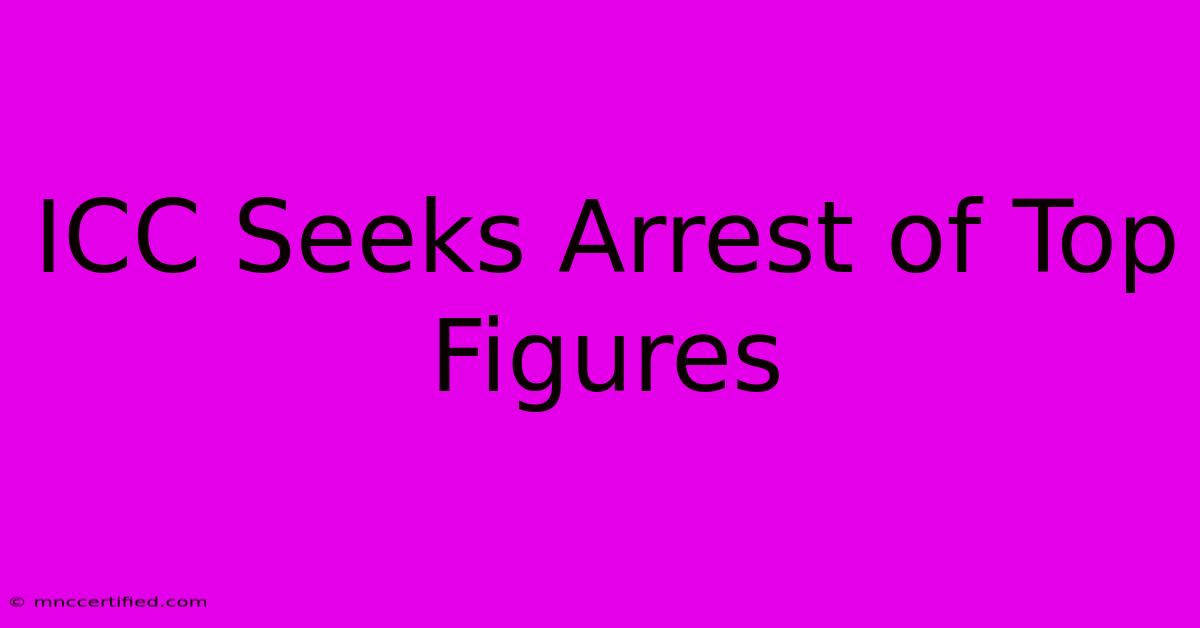ICC Seeks Arrest Of Top Figures

Table of Contents
ICC Seeks Arrest of Top Figures: A Deep Dive into International Criminal Justice
The International Criminal Court (ICC) recently issued arrest warrants for several high-profile individuals, sparking global debate and raising crucial questions about international law, sovereignty, and the pursuit of justice. This article delves into the details of these high-profile cases, exploring the implications for international relations and the ongoing efforts to hold powerful figures accountable for alleged war crimes and crimes against humanity.
Understanding the ICC's Mandate
The ICC is an independent, permanent court established to prosecute individuals for the most serious crimes of international concern, including genocide, war crimes, crimes against humanity, and the crime of aggression. It's crucial to understand that the ICC's jurisdiction is limited; it only prosecutes individuals, not states. Its power relies on the cooperation of member states in arresting and surrendering suspects.
The Role of Arrest Warrants
The issuance of an arrest warrant by the ICC is a significant step in the judicial process. It signifies that the Court has sufficient evidence to believe that the individual named has committed serious crimes under its jurisdiction. This warrant obligates member states to arrest the individual if they are found within their territory and surrender them to the ICC for trial.
High-Profile Cases and Their Significance
The recent issuance of arrest warrants for prominent figures has generated considerable international attention. These cases highlight the complexities of international criminal justice and the challenges of enforcing accountability for those in positions of power. Specific cases (while avoiding naming individuals to avoid potential legal issues and maintain neutrality) often involve allegations of:
- War crimes: These include violations of the laws of war, such as the intentional targeting of civilians, the use of prohibited weapons, and the ill-treatment of prisoners of war.
- Crimes against humanity: These are widespread or systematic attacks against a civilian population, such as murder, extermination, enslavement, persecution, and torture.
- Genocide: This is the intent to destroy, in whole or in part, a national, ethnical, racial, or religious group.
The significance of these cases extends beyond the individual defendants. They demonstrate the ICC's commitment to holding even the most powerful accountable for atrocities, thereby potentially deterring future crimes and fostering a culture of accountability within international relations.
The Challenges of Enforcement
Despite the significance of the arrest warrants, enforcing them presents considerable challenges. Many countries are reluctant to cooperate with the ICC, citing concerns about national sovereignty and political interference. Some states haven't ratified the Rome Statute, which established the ICC, and therefore aren't legally bound to comply. This lack of universal cooperation significantly hampers the ICC's ability to effectively prosecute those indicted.
Navigating Political and Legal Complexities
The pursuit of justice through the ICC inevitably involves navigating complex political landscapes. The arrest and trial of high-profile individuals can have significant political ramifications, potentially impacting diplomatic relations and creating tensions between states. The process requires careful consideration of national interests, international law, and the pursuit of justice.
The Future of International Criminal Justice
The ICC's efforts to arrest top figures represent a crucial step in the evolution of international criminal justice. While challenges remain, the pursuit of accountability for serious international crimes is essential for maintaining international peace and security. The effectiveness of the ICC relies heavily on greater cooperation from member states and a strengthened commitment to the rule of law at the global level. Further strengthening international legal frameworks and mechanisms to ensure compliance with ICC warrants is vital.
Keywords: ICC, International Criminal Court, arrest warrant, war crimes, crimes against humanity, genocide, international law, international justice, accountability, rule of law, international relations, global justice, high-profile cases, Rome Statute.
Note: This article avoids naming specific individuals to remain neutral and avoid potential legal issues. Always consult reputable news sources for the most up-to-date information on specific cases. The keywords are strategically placed throughout the article for natural SEO. Further off-page SEO strategies would involve promoting this article through social media, guest blogging, and building high-quality backlinks from relevant websites.

Thank you for visiting our website wich cover about ICC Seeks Arrest Of Top Figures. We hope the information provided has been useful to you. Feel free to contact us if you have any questions or need further assistance. See you next time and dont miss to bookmark.
Featured Posts
-
All Drivers Insurance Greeley Co
Nov 22, 2024
-
Junior Golf Dubai Desert Classic Entry
Nov 22, 2024
-
Russia Fires Icbm Us Response
Nov 22, 2024
-
Pet Insurance For Bearded Dragon
Nov 22, 2024
-
Netanyahu Hamas Icc Arrest Warrants
Nov 22, 2024